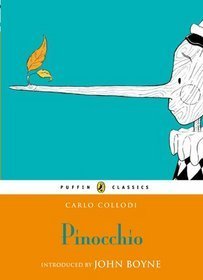Book review: Pinocchio by Carlo Collodi

When I was growing up, I would sometimes hear my mother talking to my Nonna and be completely baffled by what they were saying. They were speaking dialect. My mother’s family comes from a little village in Piedmont, Italy called Pavone and my mother’s first language was not Italian but dialect. The dialect of her village lay midway between Italian and French. So, for instance, hot and cold in dialect were cald and fredd but in Italian they are caldo and freddo and in French chaud and froid.
But to give an idea of just how specific these dialects were, there would sometimes be words I overheard that completely stumped me. I asked my mother once what they had been talking about and it turned out that my Nonna had been using a dialect word from her native village, which was about 20 kilometres away from where she lived once she got married, and that word was completely different from the Pavone dialect. That’s how regional Italian dialects were.
Which brings me on to Pinocchio. When Carlo Collodi wrote the story in 1881, Italy had only been unified into a single country for ten years. The problem was, while it was now politically one country, most of the country could not speak, nor understand, most of the rest of the country. Everyone spoke their own dialects of Italian, with many of these so different from each other as to be mutually unintelligible.
It’s hard to maintain a country where people don’t speak the same language. Italian nationalists had decided that the Florentine dialect, in which Dante, Boccaccio and Manzoni had written, was the purest and best form of Italian, the one to be elevated to the status of national language. But Dante and Manzoni are not exactly classroom texts – and still less Boccaccio, whose tales in the Decameron can still make the readers’ eyes widen in shock at their sheer rudeness; certainly not acceptable in 19th-century classrooms.
Which was where Carlo Collodi stepped in. His tale of the wooden boy, crafted by Giappetto the carpenter, who comes to life but has an unfortunate tendency towards nose-lengthening lying, became hugely popular when published and immediately found its way into Italian classrooms up and down the land.
So it was Pinocchio, the wooden boy with the big heart but spectacularly poor judgement in friends, who taught generations of Italians to be able to speak to each other in the same language. Very few stories have been so crucial in a nation’s history. Indeed, without Pinocchio, there’s a good case for saying that the always fissiparous elements of Italy would have split apart into their constituent republics, duchies and kingdoms, all of which had longer histories and more deeply ingrained loyalties than the Italian state.
A little wooden boy became the father of modern Italy. Che sorpresa!
0 Comments